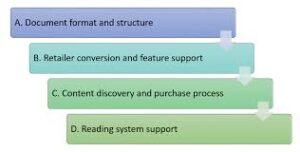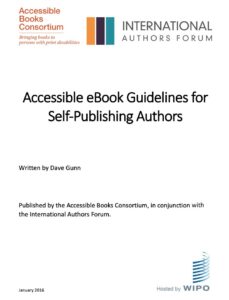Digital publishing has created such an explosion of options for indie authors in getting their books out into a worldwide marketplace, yet our books often sadly remain inaccessible to millions of readers.
Both print and ebook publications are not reaching the eyes, ears, and hands of so many people who would love to experience the immense pleasure and importance reading brings into our lives due to having a ‘print disability’.
Self-Publishing Accessible Ebooks: A New Guide
A brand new professional tool offering a comprehensive guide to empower authors in understanding the first steps towards making their manuscript accessible for millions has arrived. This comprehensive publication written by Dave Gunn, Accessible eBook Guidelines for Self-Publishing Authors is published by the WIPO Accessible Books Consortium, in conjunction with the International Authors Forum (IAF), and is being made available to you by the Alliance of Independent Authors.
This is a tremendous resource that every indie author who is keen to create accessible eBooks should peruse.
This set of guidelines the first of its kind. It also provides a highly practical overview of the world of accessible publishing, complete with a helpful checklist, and a “further resources” list.
All this strengthens an author’s sense of confidence in creating their next manuscript in an accessible publication format, and reading through the set of guidelines opens one’s eyes to key terms while raising one’s awareness to current software options when considering the design of an accessible eBook.
One of the highlights of reading through the guidelines as a vision-impaired author is knowing that I can also take advantage of a set of guidelines accessible to both author and reader.
Why Publish Accessible Ebooks?
As a visually-impaired person and indie author myself, I am not fond of placing people into categories but it is worth pointing out that this group includes those living with a physical or sensory disability (such as being blind or vision-impaired), as well as those having a cognitive and learning disability – with Dyslexia affecting a staggering one in ten people globally. Therefore, it is highly probable that potential readers are not accessing our books and it doesn’t have to be this way. Katie Webb[/caption]
In a few easy steps you can open up your books to the millions of readers who can’t access texts in conventional formats because they are visually impaired or otherwise ‘print disabled’.
I am so grateful to our industry ‘watchdogs’ such as the International Authors Forum (IAF), the Accessible Books Consortium (ABC) and the Alliance of Independent Authors (ALLi) who are dedicated to creating a global network empowering authors with a set of standards that will make more books accessible to more people.
If the seeking of knowledge and the freedom to read books is important to you, I encourage all writers and publishers to seriously consider how creating ebooks in accessible formats is the next frontier to publishing: by taking up the recommendations set out in these guidelines, we open the way forward to create more possibilities for a worldwide readership.
Be a proud link in the chain which enables people like myself to stay connected through our passion for our craft.
Together, we can support each other and bring the focus on reaching a whole new audience by designing our manuscripts in an accessible format available for everyone to enjoy.
Accessible eBook Guidelines for Self-Publishing Authors – Download Here
Self-Publishing Accessible Ebooks: A Guide for Indie Authors
Share
Comments are closed.
Latest advice, news, ratings, tools and trends.
AI Licensing Platform ‘Created by Humans’ Launches, Plus Amazon Literary Partnership Expands to Ireland: The Self-Publishing News Podcast with Dan Holloway
On this episode of the Self-Publishing News Podcast, Dan Holloway covers the launch of Created by Humans, an AI rights licensing platform, and the Copyright Clearance Centre's new initiative to include AI permissions in their annual copyright licenses. Dan also discusses the expansion of the Amazon Literary Partnership into Ireland, highlighting its support for a range of literary organizations and the opportunities for authors to apply for the 2025 grants.
Self-Publishing News: Universal Basic Income for Creatives and Amazon Literary Partnerships Expand to Ireland
Universal Basic Income is at the center of one of the two stories I want to highlight this week, both of which revolve around supporting creative work. While this story isn’t directly about AI, it uses an AI angle in its original reporting because that is zeitgeisty. AI is currently seen as an existential threat by many, taking over jobs they rely on for their survival.
Reader Magnets and Growing Your Email List for Indie Author Success: The Reaching More Readers Podcast with Dale L. Roberts and Holly Greenland
This month in the Reaching More Readers podcast, Dale L. Roberts and Holly Greenland wrap up their journey around the tips and tricks for email marketing for indie authors. This time, they'll take a closer look at offering “reader magnets,” the importance of testing your mailer systems, and further tips on growing your list. Look back at previous Reaching More Readers episodes for information about why an email list is so important for indie authors and to find out how you can establish your newsletter process.









[…] Reaching all our Readers: Making books that Everyone can read: Katie Webb & Maribel Steel […]
[…] Reaching all our Readers: Making books that Everyone can read: Katie Webb & Maribel Steel […]
[…] Reaching all our Readers: Making books that Everyone can read: Katie Webb & Maribel Steel […]